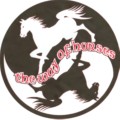
DEWORMERS Eleanor Richards
Copyright
©
2004 "What is the difference between all the horse dewormer products?" First, you need to ignore the brand names. Second, learn what the active ingredients control. "What are the active ingredients and what do they do?" The 5 most commonly used ingredients are Febendazole, Ivermectin, Moxidectin, Praziquantel, and Pyrantel. Febendazole: Controls large strongyles, encysted early third stage, late third stage and fourth stage cyathostome larvae, small strongyles, pinworms, and ascarids. Ivermectin: Controls large strongyles, small strongyles, pinworms, ascarids, hairworms, large-mouth stomach worms, bots, lungworms, and intestinal threadworms. Moxidectin: Controls large strongyles, small strongyles, pinworms, ascarids, encysted cyathostomes, hair worms, large-mouth stomach worms, and bots. Praziquantel: Controls tapeworms. Pyrantel Pamoate: Controls large strongyles, small strongyles, pinworms, ascarids, and tapeworms (when double-dosed). Pyrantel Tartrate: Controls large strongyles, small strongyles, pinworms, and ascarids. It is the ingredient in daily dewormers. "Why are there so many types?" Overtime parasites have developed a resistance to some of the deworming chemicals. Researchers are constantly developing new products that are more effective and control worms at different stages of maturity. "How do I know which one to use?" If your horse is old, very young, or has never been dewormed you should consult your veterinarian. A fecal test can help determine what worms your horse has and can help you decide which dewormer would be most effective. Your veterinarian can conduct this test. Looking at the list of active ingredients you will notice ivermectin controls the most types of worms, except for tapeworms. Because it controls bots many people will deworm with it in the spring and fall. This is when bots are in the stage to be controlled. The rest of the year they deworm with another ingredient in a rotational program. It is advised to deworm for tapeworms at least once a year, so a product containing praziquantel should be used. "How often should I use a deworming product?" How often a person deworms a horse depends on the age, the environment, previous deworming history, and health issues. Your veterinarian can advise you on a schedule. Here are some very general guidelines. Ascarids, also known as roundworms, mainly effect horses under 15 months of age. Most veterinarians recommend a foal be dewormed for the first time between 1 and 2 months of age. Extreme care must be observed because if large amounts of worms are killed a blockage of the intestinal tract can occur. A half dose can be administered and then a week later a second dose given. After that some advise the foal be dewormed every 2 months until 2 years of age. Older horses gradually develop immunity to ascarids. Caution: DO NOT GIVE MOXIDECTIN TO FOALS LESS THAN 6 MONTHS OF AGE (The products are Quest and Zimectrin Gold). This is a very strong chemical and may be fatal to young foals. The environment in which your horse is kept plays a big part in how often he needs dewormed. An adult horse kept in a stall or turnout lot, with no access to grass or other horses may not need to be dewormed as often as another horse in a different situation. Removing the manure from pastures can decrease the chances of infection. If you purchase a new horse, especially one younger than 2 years of age, and do not know the deworming schedule care must be taken when deworming for the first time. Consult a veterinarian and conduct a fecal test. Horses with a history of colic may benefit from the use of a daily dewormer. It has been documented that horses with chronic colic episodes may show improvement when started on these products. A product that kills bots will need to be used at least twice a year. * Go to www.horsecoursesonline.com and enroll to take the online course "How to Feed For Maximum Performance" taught by Eleanor Richards. One of the online courses required to achieve a Bachelor of Science Degree in Equine Studies from Breyer State University. |


THE WAY OF HORSES |